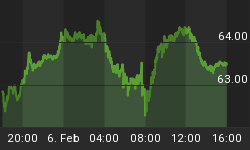Some steadfast bears are reiterating that the U.S. stock markets are rigged, that the Dow is only making new highs because of timely component changes, and that any new highs in stocks are insignificant when adjusted for inflation. Before joining in the fun, it should, at minimum, be conceded that bearish forecasts have not gone according to plan. Rather, nearly 7-years after the market bust began the combined value of all U.S. stocks hit an new all-time high last week and the Dow is closing at record highs this week. Those that have cried wolf since 2000 claiming a repeat of 1990s Japan could be in the offing, myself included, were mistaken.
With that out of the way, here is why the Dow is rising even as the U.S. economy shows signs of slowing down: liquidity. But how can the equity markets continue to find more liquidity when the yield curve is inverted and the Fed just finished hiking interest rates for the 17th time in a row? Here is how:

"...that too much money has floated assets that might otherwise be shipwrecked is not really in question. Which asset class will benefit when one or more asset classes go bust is...welcome to the financial world where hedge funds are an ever widening force, and where central banks inadvertently condone widespread speculation via telegraphed rate movements." 2Q06 Wish List
So, some money previously reserved for wild real estate activities is riding high in blue chips, hedge funds have de-leveraged commodity positions to scoop up underperforming (compared to small caps) large caps, and some stubborn bears that tried to time the markets short have turned into buyers to cover. Are these the only reasons why U.S. stocks are rallying? Not exactly - there have been some other drivers as well:
U.S. corporate bonds just capped off their biggest gain since the second quarter of 2003, S&P says corporate defaults hit a record low of 1.44% in August, and, on average corporate balance sheets are as sturdy as they have been in decades.
I don't necessarily buy into the idea that the corporate debt markets are behaving rationally, or that default rates are at not about to spike higher, or that stronger debt/equity readings mean that corporate America will not suffer crushing blow-ups if the U.S. economy continues to slow. Nevertheless, with many markets pricing in the continuation of corporate bliss and, broadly speaking, corporate balance sheets showing little signs of stress as the profits-train keeps climbing, it is difficult to cry wolf with a loud and timely voice.
Yes, people in America still treat potentially risky investment instruments as a savings account, and the money managers in control of these accounts still chase performance irregardless of valuation concerns. But no, it is not worth screaming that as the U.S. economy continues to slow the perfectly priced financial markets are doing little more than walking down the plank. Why not warn investors of the troubles ahead? Because, quite frankly, no one wants to listen: those that cry wolf be damned - a repeat of 1990s Japan didn't happen!
In short, the unspoken hope is that stock market delusions can, somehow someway, dictate tomorrow's economic reality. This dynamic worked well for a brief period during the late 1990s...until it didn't. And yes, a major stock market bust from March 2000 to October 2002 did happen.















